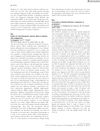 July 2020 in “Hair transplant forum international”
July 2020 in “Hair transplant forum international” Androgens might play a role in the severity of COVID-19.
 March 2024 in “Sudan Journal of Medical Sciences”
March 2024 in “Sudan Journal of Medical Sciences” Many doctors lack knowledge about COVID-19 skin symptoms and need better education and guidelines.
December 2023 in “International journal of research publications” Herbal medicine and nutraceuticals may help treat Post COVID-19 Syndrome, but more research is needed.
 16 citations,
December 2020 in “International Journal of Clinical Practice”
16 citations,
December 2020 in “International Journal of Clinical Practice” The pandemic changed how often certain skin conditions were diagnosed.
 February 2022 in “International journal of KIU”
February 2022 in “International journal of KIU” Certain genes and nutrients like vitamin D, zinc, and omega fatty acids affect COVID-19 severity and infection risk.
 1 citations,
January 2022 in “Turkiye Klinikleri Journal of Dermatology”
1 citations,
January 2022 in “Turkiye Klinikleri Journal of Dermatology” Lifestyle changes during the early COVID-19 outbreak led to more cases of acne and other skin conditions, but fewer cases of rosacea and skin infections.
 November 2023 in “Klìtinna ta organna transplantologìâ”
November 2023 in “Klìtinna ta organna transplantologìâ” MSC-derived exosomes can help treat COVID-19, hair loss, skin aging, and arthritis.
 January 2023 in “Brazilian Journals Editora eBooks”
January 2023 in “Brazilian Journals Editora eBooks” Nursing staff's mental health was affected during the COVID-19 pandemic.
 September 2023 in “Journal of the European Academy of Dermatology and Venereology”
September 2023 in “Journal of the European Academy of Dermatology and Venereology” The Gabrin sign may help identify COVID-19 patients at high risk who also have hair loss due to male hormones.
 July 2022 in “Jurnal Farmasi Galenika (Galenika Journal of Pharmacy)”
July 2022 in “Jurnal Farmasi Galenika (Galenika Journal of Pharmacy)” Older men with diabetes were more likely to get severe COVID-19 and needed treatments like antivirals for about 2-3 weeks.
 March 2022 in “medRxiv (Cold Spring Harbor Laboratory)”
March 2022 in “medRxiv (Cold Spring Harbor Laboratory)” People with blood group O may have a higher risk of developing post-COVID-19 syndrome.

Stem cell therapies, especially adipose-derived ones, show promise for treating severe COVID-19 and related conditions.
 51 citations,
August 2021 in “Turkish Journal of Medical Sciences”
51 citations,
August 2021 in “Turkish Journal of Medical Sciences” As of December 2021, the most effective COVID-19 treatments were monoclonal antibodies and possibly early-administered convalescent plasma, while several drugs were found ineffective or were still under evaluation.
 88 citations,
October 2020 in “Open Forum Infectious Diseases”
88 citations,
October 2020 in “Open Forum Infectious Diseases” Some people who recover from COVID-19 continue to have symptoms like fatigue and cough for over 120 days, and some experience hair loss about 59 days after getting sick.
 16 citations,
November 2020 in “PLOS ONE”
16 citations,
November 2020 in “PLOS ONE” Your lifestyle and health can affect your chances of getting COVID-19; not enough sleep, lots of exercise, and hair loss can increase risk, while washing hands, eating fruit daily, and taking vitamins A and C can lower it.
 October 2020 in “Проблемы эндокринологии”
October 2020 in “Проблемы эндокринологии” Men with higher androgen levels may have severe COVID-19 symptoms, but those on antiandrogen therapy are less likely to contract the virus and have milder symptoms. Anti-androgen drugs could potentially treat COVID-19, but more research is needed.
 24 citations,
August 2020 in “AJGP”
24 citations,
August 2020 in “AJGP” A woman's sudden hair loss was linked to her previous COVID-19 infection.
27 citations,
January 2020 in “Acta dermatovenerologica Alpina, Pannonica et Adriatica (Tiskana izd.)” Healthcare workers in Turkey experienced more skin problems due to frequent handwashing and wearing masks and gloves during the COVID-19 outbreak.
 6 citations,
May 2021 in “Clinical Chemistry and Laboratory Medicine”
6 citations,
May 2021 in “Clinical Chemistry and Laboratory Medicine” Different ACE2 gene versions may affect COVID-19 impact based on age and suggest some hair loss drugs could be potential treatments.
June 2020 in “Faculty Opinions – Post-Publication Peer Review of the Biomedical Literature”  January 2022 in “International Journal of Nutrology”
January 2022 in “International Journal of Nutrology” Diet and nutrients, including lycopene from tomatoes and hydroquinone from wheat, can help control melasma, a skin condition.
August 2021 in “Journal of cosmetic dermatology” The editorial stresses the importance of COVID-19 vaccination and ongoing contributions to the journal.
 July 2021 in “British Journal of Dermatology”
July 2021 in “British Journal of Dermatology” The pandemic likely caused delays in skin cancer assessments, leading to fewer early diagnoses and thicker melanomas.
 2 citations,
October 2020 in “Annals of Oncology”
2 citations,
October 2020 in “Annals of Oncology” Men may be more vulnerable to severe COVID-19 due to genetic and hormonal factors, but more research is needed.
 5 citations,
July 2021 in “medRxiv (Cold Spring Harbor Laboratory)”
5 citations,
July 2021 in “medRxiv (Cold Spring Harbor Laboratory)” Proxalutamide improved blood markers related to inflammation, immune response, and clotting in COVID-19 patients, potentially reducing hospitalizations.

The extract from the plant Adiantum capillus-veneris might be used to treat COVID-19.

Maidenhair fern extract might help treat COVID-19 symptoms, but more research is needed.
 49 citations,
January 2021 in “Journal of The European Academy of Dermatology and Venereology”
49 citations,
January 2021 in “Journal of The European Academy of Dermatology and Venereology” Anti-androgens, like finasteride, dutasteride, and spironolactone, may lessen the severity of COVID-19 in men, leading to fewer ICU admissions.
October 2023 in “Journal of Gandhara medical and dental sciences” Quarantine increased hair fall, especially in young women, with no direct link to short sun exposure.
 6 citations,
March 2022 in “Frontiers in drug discovery”
6 citations,
March 2022 in “Frontiers in drug discovery” Some small molecule antivirals show promise against COVID-19, but more research is needed to understand and improve them.

























